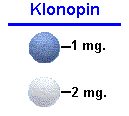| iPsychology
|
|
Clonazepam ( Klonopin ) Clonazepam ( Klonopin ) is an anticonvulsant primarily used in the treatment of seizure disorders. Clonazepam ( Klonopin ) is a member of a class of drug known as benzodiazepines.This drug may also be used as an antianxiety, for the short-term relief of mild to moderate anxiety. Clonazepam ( Klonopin ) may also be used to treat movement disorders ( e.g., Tourette's Syndrome ), panic disorder, drug-induced mania, to help resistant depression, nocturnal myoclonus, relieve trigeminal neuralgia, bipolar affective disorder, and to help control certain types of petit mal, atypical, akinetic, myoclonic, or absence seizures.
Dosages: Normal dosage:
Problems with:
Test:
Take With: Empty stomach with milk or with food. Full Benefits In: First day to a week. Missed Dose(s): If within one hour take, if over an hour skip and then continue on your normal schedule. Never Take a Double Dose. If Stop Taking: Do not stop without consulting your physician and never abruptly if taking to control seizures or if have been taking for more than four weeks.. Overdose symptoms include: Confusion, loss of consciousness, or slowing of reflexes. Warnings Narcotics may increase the sedative effects of this drug. Do not take other sedative, benzodiazepines,or sleeping pills with this drug. The combinations could be fatal. Do not drink alcohol when taking benzodiazepines. Alcohol can lower blood pressure and decrease your breathing rate to the point of unconsciousness. The habit-forming potential is high. Psychological and physical dependence is common. It is possible to become dependent in only two to four weeks. If used for antianxiety treatment: This drugs should not be taken for more then four weeks ( Yudofsky, Hales and Ferguson ). Do not stop taking this drug abruptly, this could cause psychological and physical withdrawal symptoms. Do not take this drug if you are pregnant or if planning to become pregnant. Do not take if you are breast-feeding. Do not take this drug if under eighteen and in small doses if over sixty with close monitoring. Do not use if:
Symptoms or Effects Common: Anxiety, behavior problems, insomnia, irritability, drowsiness, or problems with coordination. Rare: Abdominal cramps, blurred vision, chest congestion, coated tongue, confusion, convulsions, depression, diarrhea, double vision, dry mouth, fever, fluid retention, hair loss, hallucinations, headache, involuntary eye movement, loss of voice, memory loss, racing heartbeat / palpitations,shaking / slurred speech, sore gums, staggering / trembling,trouble breathing ,unusual bleeding / bruising, or urination problems. See physician always: Abdominal cramps, blurred vision, chest congestion, coated tongue, confusion, convulsions, depression, diarrhea, double vision, dry mouth, fever, fluid retention ,hair loss, hallucinations, headache, involuntary eye movement, loss of voice,memory loss, racing heartbeat / palpitations ,shaking / slurred speech, sore gums, staggering / trembling, trouble breathing, unusual bleeding / bruising, or urination problems. See physician if severe: Anxiety, behavior problems, insomnia, irritability, drowsiness,or problems with coordination. See physician NOW: Confusion. Stop taking and see physician NOW: Convulsions, hallucinations, memory loss, trouble breathing, or staggering / trembling. [1] [2] Next Page
|
|

